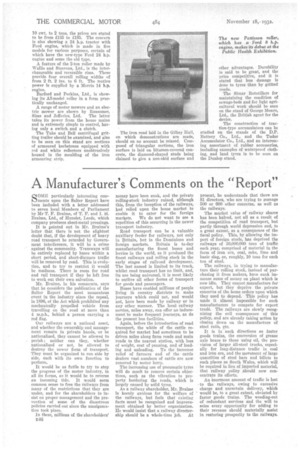A Manufacturer's Comments on the "Report 19 S OMB particularly interesting
Page 72

If you've noticed an error in this article please click here to report it so we can fix it.
corements upon the Salter Report have been included with a letter addressed to seven local Members of Parliament by Mr T. F. Braime, of T. F. and I. H. Braime, Ltd., of Runlet, Leeds, which company produces sheet-metal pressings.
It is pointed out in Mr. Braime's letter that there is not the slightest doubt that, if the development of heavy road transport be retarded by Government interference, it will be a crime against the community. Tramways will be entirely replaced by buses within a short period, and short-distance traffic will be removed by road. This is evolution, and to tryto restrict it would be madness. There is room for road and rail transport if they be left free to work out their own salvation.
Mr. Braime, in his comments, says that he considers the publication of the Salter Report the most momentous event in the industry since the repeal, in 1896, of the Act which prohibited any mechanically propelled vehicle from travelling on the road at more than 4 m.p.h., behind a person carrying a red flag.
Our railways are a national asset, and whether the ownership and management remain in private hands, or be nationalized, they cannot be allowed to perish ; neither can they, whether nationalized or not, be allowed to destroy the newer form of transport. They must be organized to run side by side, each with its own function to perform.
It would be as futile to try to stop the progress of the motor industry, in all its forms, as it would be to reverse an incoming tide. It would seem common sense to free the railways from many of the restrictions that they are under, and for the shareholders to insist on proper management and the prevention of some of the disastrous policies carried out since the amalgamation took place.
In these, millions of the shareholders' B46 money have been sunk, and the private rolling-stock industry ruined, although this, from the inception of the railways, had relied upon the home market to enable it to eater for the foreign markets. We do not want to see a repetition of this occurring in the newer transport industry.
Road transport can be a valuable auxiliary feeder for railways, not only in Britain, but in the Dominions and foreign markets. Britain is to-day manufacturing the finest busts and lorries ill the world, as it produced the finest railways and rolling stock in the early stages of railroad development. The last named is limited to its track, whilst road transport has no limit, and, its use being universal, it is most likely to outlive all other forms of transport for goods and passengers.
Buses have enabled millions of people living in country districts to make journeys which could not, and would not, have been made by railway or in any other manner. The kcal railway service, miles away, can offer no inducement to make frequent journeys, as do the present bus facilities.
• Again, before the introduction of road transport, the vvhble of the cattle required for market bad sometimes to be driven miles along farm roads and main roads to the nearest station, with loss of weight, cost of penning, and of loading and unloading. To the immense relief of farmers and of the cattle dealers vast numbers of cattle are now removed by motor lorry.
The increasing use of pneumatic tyres will do much to remove certain objections, such as the vibration to property bordering the roads, which is largely caused by solid tyres.
As a railway shareholder, Mr. Braime is keenly anxious for the welfare of the railways, but feels that existing facts must be recognized and improvement obtained by better organization. He would insist that a railway directorship should be a whole-time job. At
present, he understands that there are Si directors, who are trying to manage 500 or 600 other concerns, as well as the railways.
The market value of railway shares has been halved, not all as a result of the competition of road transport, but partly through world depression and, to a great extent, as a consequence of the fiscal policy. This, by allowing the import of foreign steels, has deprived the railways of 30,000,000 tons of traffic each year, comprised of material in. the form of iron ore, coal, coke, lime and basic slag, or, roughly, 10 tons for each ton of steel.
The railways, in trying to manufacture their rolling stock, instead of purchasing it from makers, have sunk immense sums of money on plant which is now idle. They cannot manufacture for export, but they deprive the private concerns of the home orders upon which they used to depend. This policy has made it almost impossible for such manufacturers to compete for export trade. The railways are slowly recognizing the evil consequence of this policy, and are already taking action by closing down on the manufacture of steel rails, etc.
It is in such directions as faster goods trains, the conversion of grease axle boxes to those using oil, the provision of larger all-steel trucks, especially for long-distance traffic in coal and iron ore, and the movement of large quantities of steel bars and billets to such places as South Wales, which will be required in lieu of imported material, that railway policy should now concentrate its efforts.
An 'enormous amount of traffic is lost to the railways, owing to excessive charge and uncertain delivery, which would be, to a great extent, obviated by faster goods trains. The weeding-out of redundant services and the will to seize every opportunity for adding to their revenue should materially assist in restoring prosperity to the railways.




















































































































